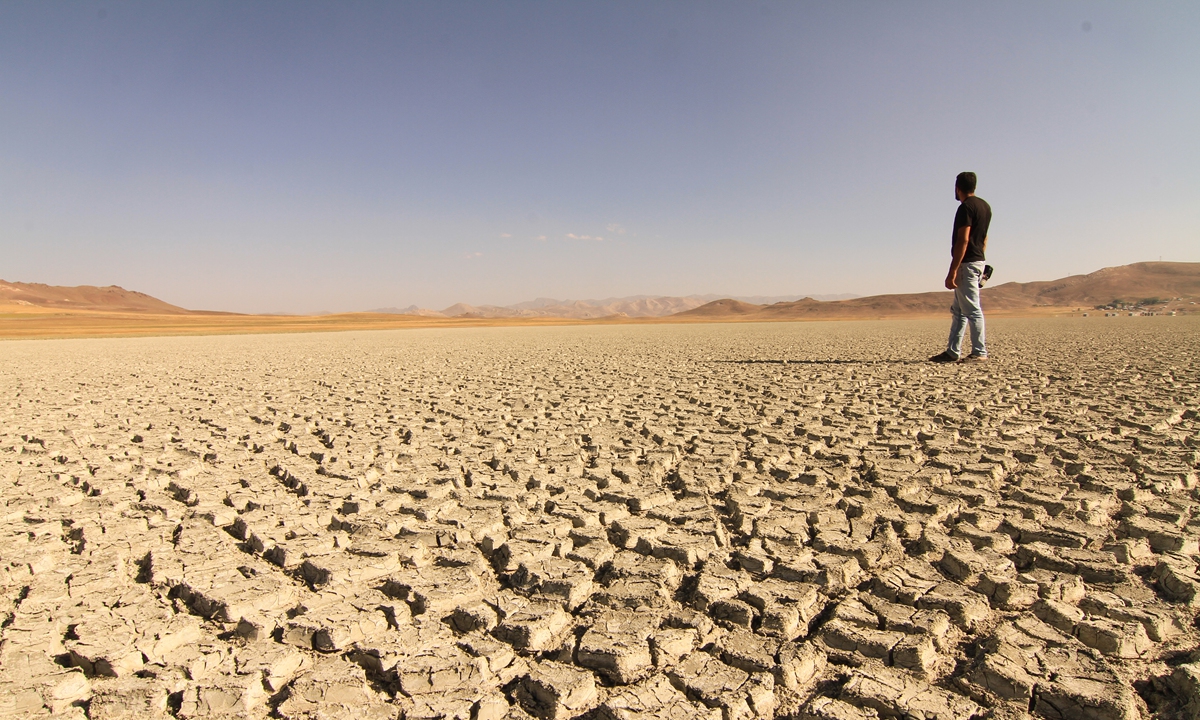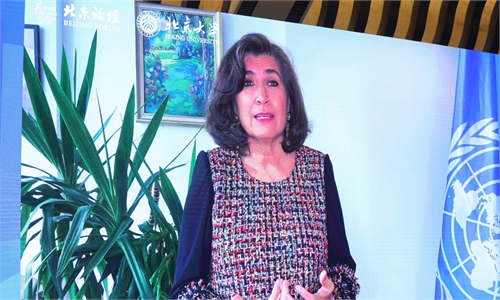Extreme heat events that occur every 50 years now will ‘take place more frequently by the end of 21st century’

A man stands on a cracked soil of Lake Akgol, dried out due to heat wave and vaporization, in the Ozalp district of Van Province, Turkey, on August 10, 2022. Photo: VCG
Extreme heat events that occur every fifty years now will take place more frequently at a rate of every one or two years by the end of 21st century in China, Zhang Xingying, a national political advisor warned on Thursday, while proposing that China should strengthen its capability to cope with climate change, especially in the urban areas.
Zhang, who is the deputy director of the China Meteorological Administration (CMA) Science and Technology and Climate Change Office, told the Global Times on Thursday that his judgment was based on a CMA study, through which they have determined that under the current high emission rate, the increase of temperature could be as high as 6.5C and China's regional amount of precipitation could be up by 18 percent.
Zhang said that the greenhouse gases emission due to human activities since the industrial revolution were the primary causes behind the more frequent and more fierce heat around the globe.
In the meantime, instances of extreme cold will decrease, Zhang predicted.
China is more vulnerable to climate change due to its complex climate conditions and overall fragile ecological environment, especially in large, dense cities which also house significant amounts of important infrastructure.
Frequent urban heat islands and waterlogging have increasingly inflicted negative impacts on urban infrastructure and city-based economies. Adapting to climate change is an important measure to reduce climate risk and vulnerability. Actively taking effective measures to enhance the capability to adapt to climate change can reduce its adverse impacts and losses, Zhang said.
The 14th CPPCC National Committee has set up a new unit for its members from environmental and resource-related circles. It is a major adjustment to the CPPCC's sector makeup over the past 30 years. Zhang from the CMA is a member of this new group.
By the end of the 14th Five-Year Plan period (2021-2025), China will lower its carbon dioxide emissions per unit of GDP by 18 percent from 2020 and increase the share of non-fossil fuels in primary energy consumption to around 20 percent.
Zhang proposed that under these goals, China should strengthen monitoring capabilities for extreme weather incidents and their impacts and early warning services for key industrial sectors, establish evaluation systems for the effects of the implementation for climate change responding measures and increase financial and science and technology support to respond quickly and effectively to climate change.
Also, China should further strengthen research on the impact of climate change and extreme weather and climate events on urban water resources, energy, transportation and other security requirements, and incorporate climate change risks into the technical standards and specifications of relevant construction, to improve the construction and prevention standards and cities' resilience against climate change challenges.
Big data and artificial intelligence technology should be introduced to the risk warning and city information platform so as to enable early warning information could be released in a timely and rapid fashion and to improve city's management capabilities for climate risks, according to Zhang's proposal.
Meteorological services in Chinese could be also improved to be more surgical and become part of the urban public service system, Zhang proposed.


